The best underwater fishing camera: see what's happening below the surface
Get bigger bites down below, by using the best underwater fishing cameras to stalk your catch
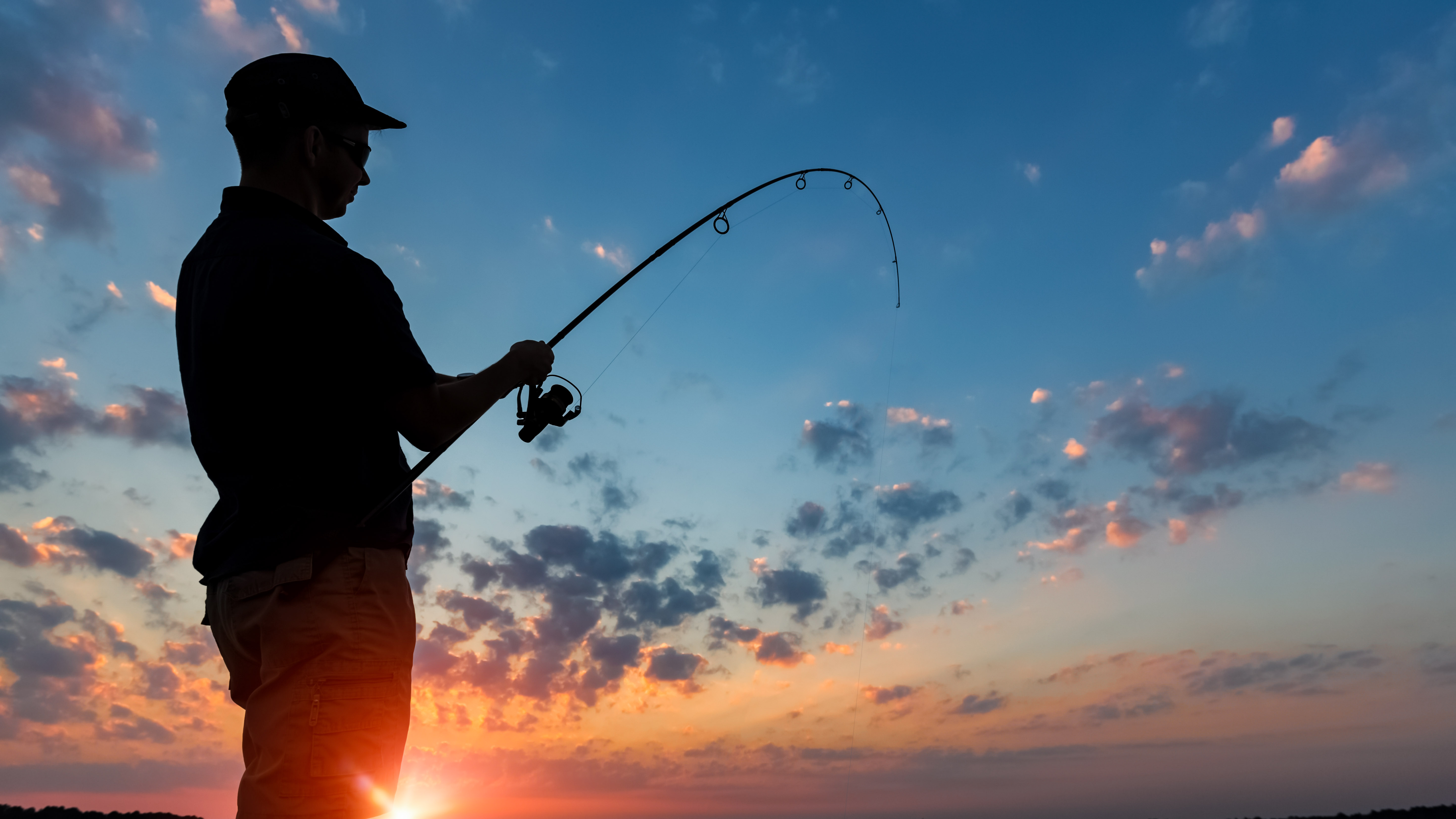
The best underwater fishing cameras offer an ingenious way to catch more fish. By giving a clear view of what’s happening beneath the surface, they're likely to pay for themselves over time.
At their simplest, such systems are comprised of an underwater camera and a monitoring screen connected by a cable, which can be extended or retracted courtesy of a spool. This involves manually raising and lowering the camera by hand. Some cameras, meanwhile, can be deployed on the line, to work alongside your bait, and some mimic regular floats. They may also feature extra lights for dark waters. Some even provide footage in real time, usually via a dedicated app.
Below you'll find the best underwater fishing cameras on sale today. We've included models at a range of price points, as well as some alternatives to fishing cameras, such as a drone, a sonar imaging camera or a diving camera to stalk your prey.
Our top picks
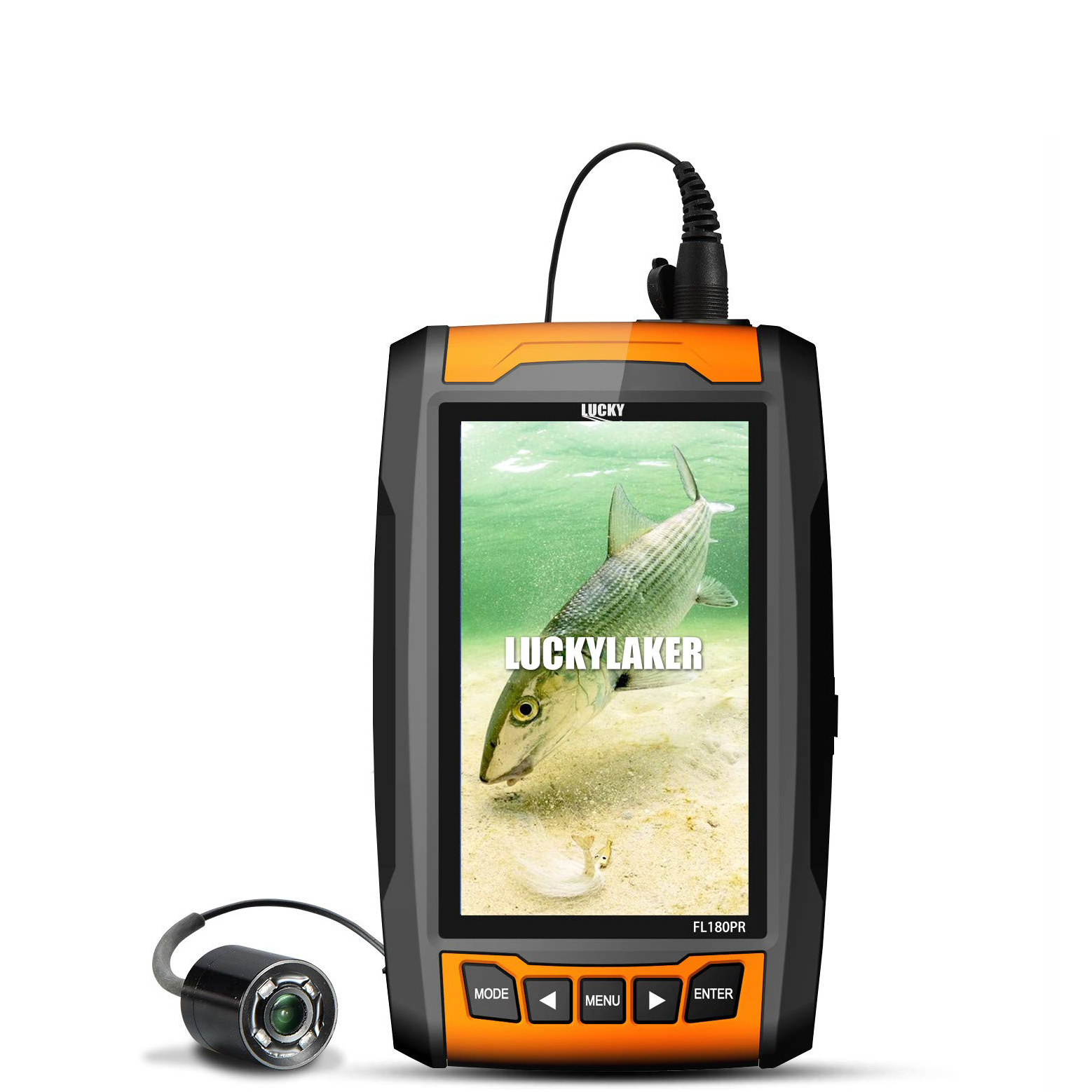
Best for clear water
Designed for use in clear water, this setup features a camera, slender 20m (65 foot) cable on a reel, plus a 4.3-inch LCD resembling a typical digital camera back.
Read more below
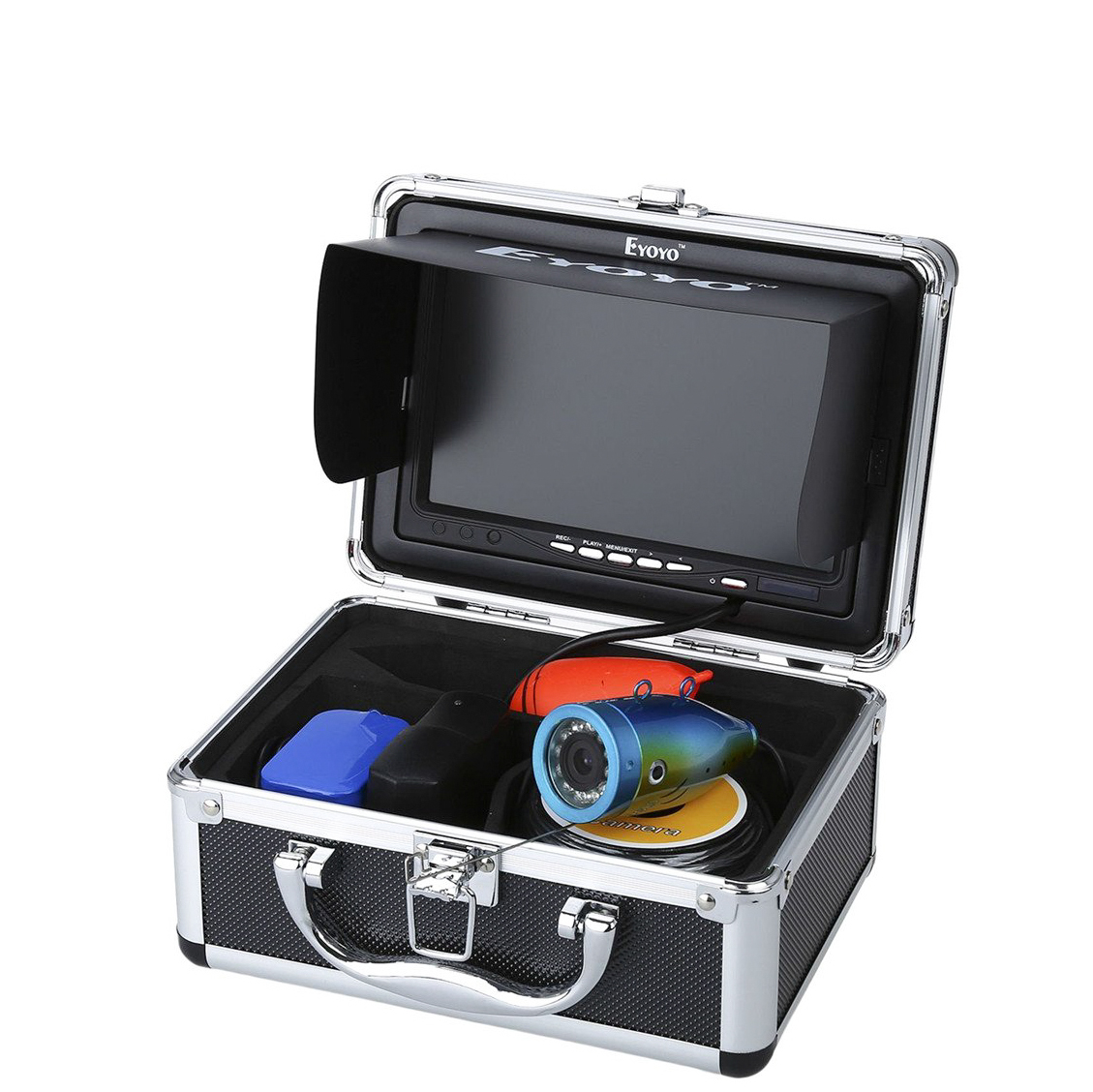
Best all-round
Housed in its own hard case, this is a great all-round choice coming with a 7in LCD screen, and with lights that enable you to film in the darkest conditions. Choose between 15, 30 or 50m cable depending on what you are fishing for.
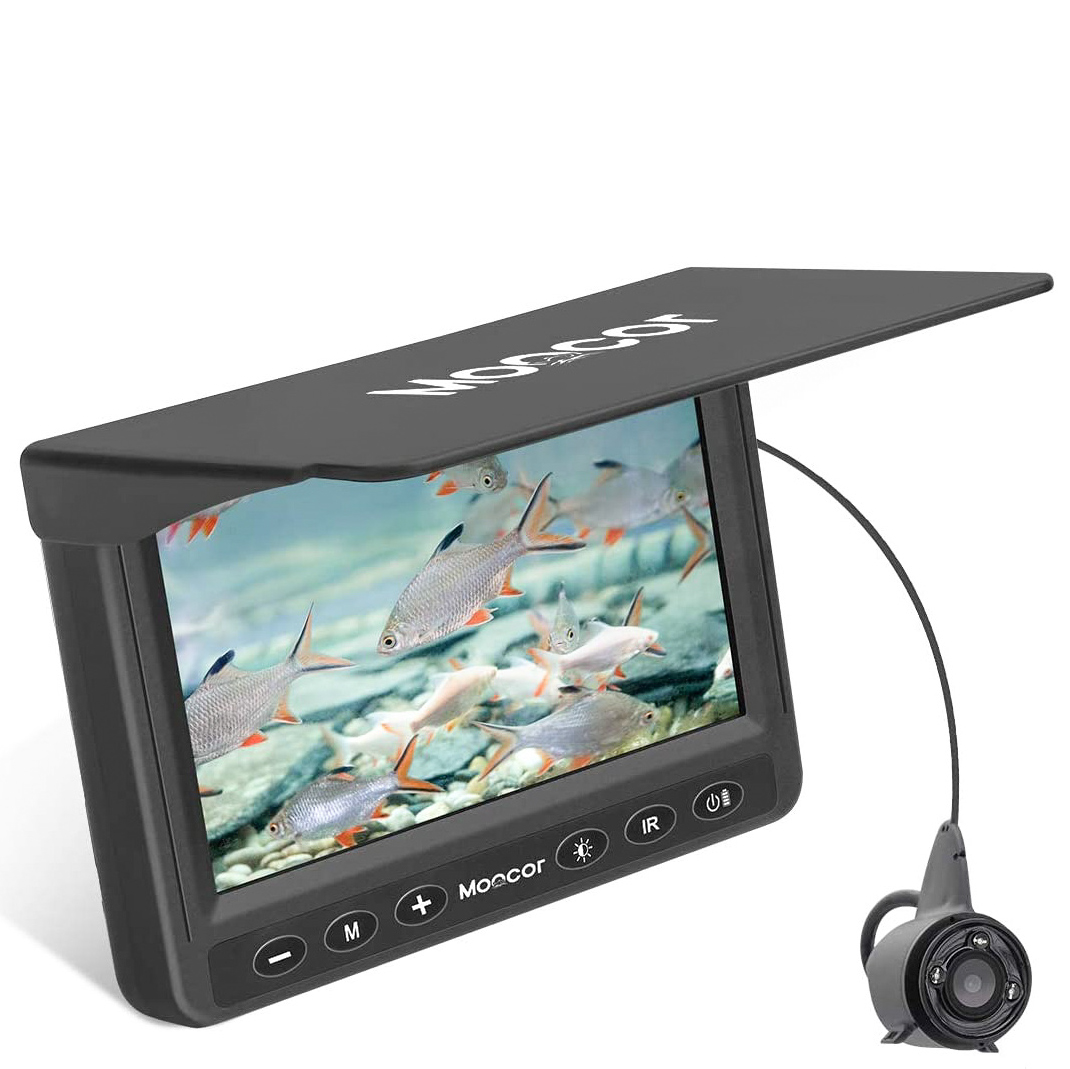
Best for icy waters
This camera is a potential game changer for the ice fisher, thanks to 15m / 50ft of cable, three IR lights around the lens, a combined screen shade / cover, and 4x digital zoom.
Read more below
Best underwater fishing camera in 2025
Why you can trust Digital Camera World
The best underwater fishing camera for clear water
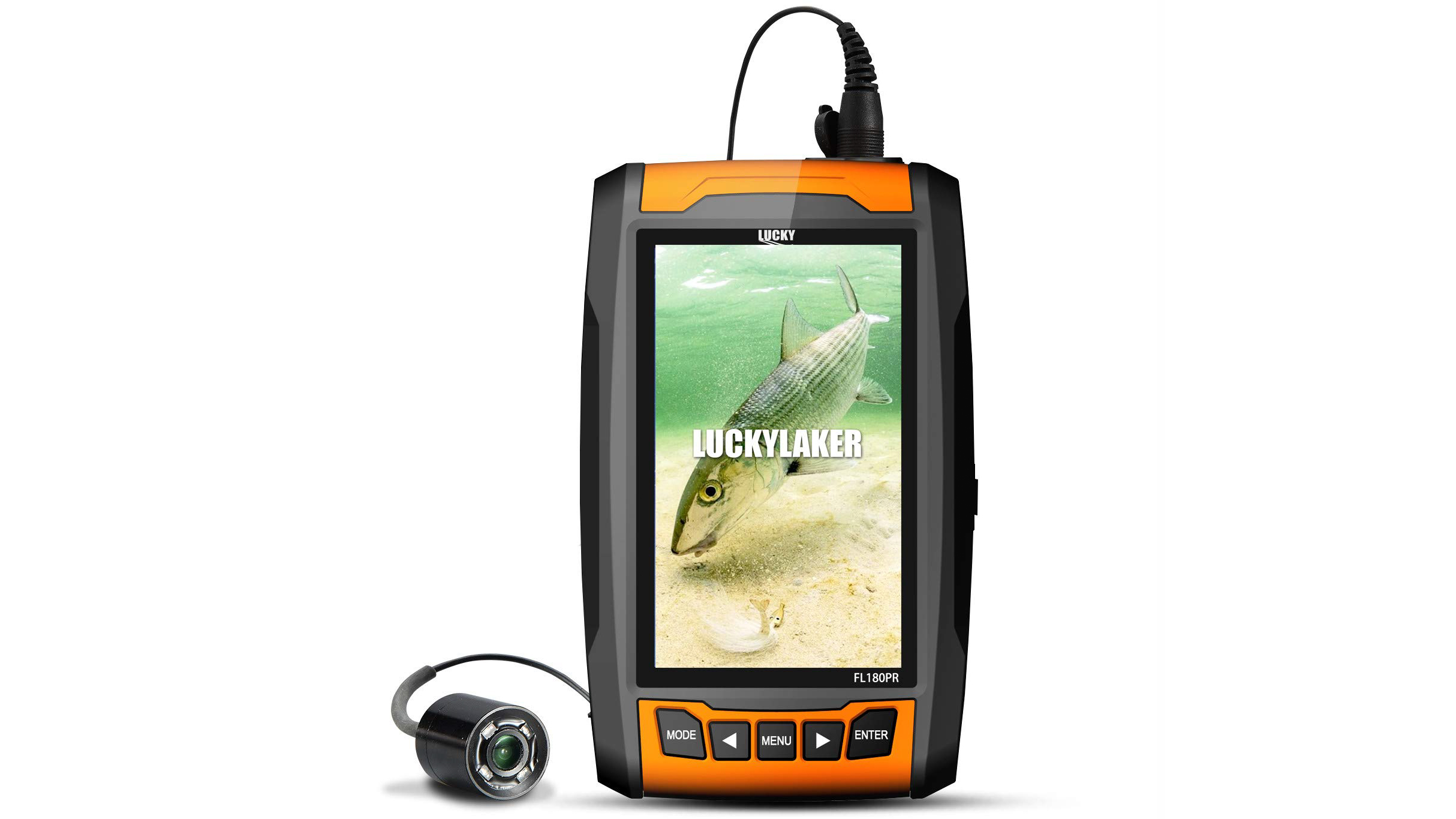
1. Lucky Underwater Fishing Camera Viewing System
Specifications
Reasons to buy
Reasons to avoid
Designed for use in clear water, this setup features a camera, slender 20m (65 foot) cable on a reel, plus a 4.3-inch LCD resembling a typical digital camera back. There are operational buttons provided to remotely take the shot, not just review it. Functions include video recording and still picture taking, with the ability to view both on screen. The unobtrusive camera element features four infrared LED lights ranged around its lens, enabling fish to be observed even in darker waters.
Battery life is good for up to four hours of use when fully charged, with a USB cable helpfully provided. Plus if you choose, you can mount the monitor section on the handle end of your rod, so you’re not distracted from the sport itself.
The best all-in-one underwater fishing camera
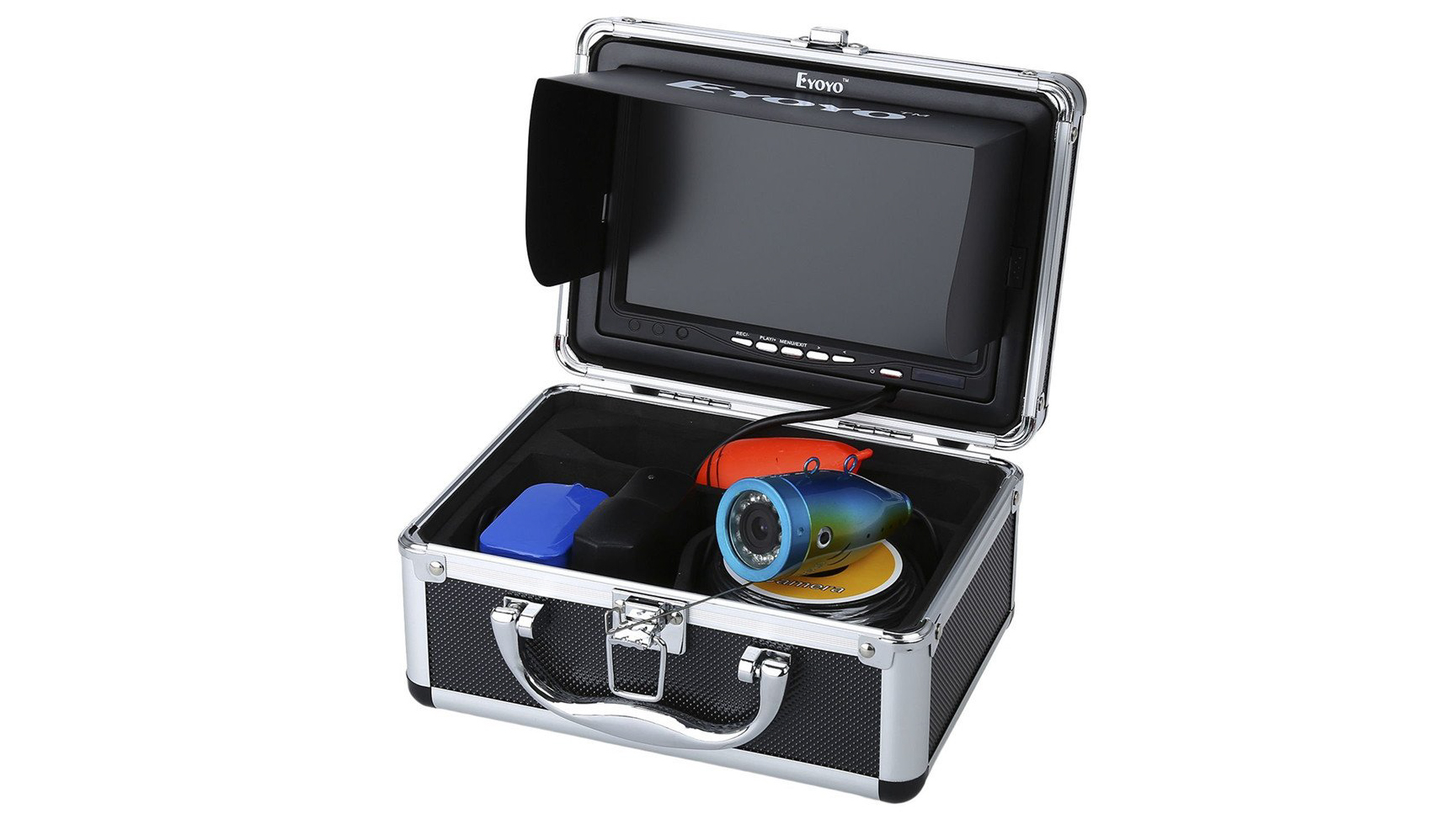
2. Eyoyo 1000TVL
Specifications
Reasons to buy
Reasons to avoid
Everything you need for remote underwater fish watching within the one easy-to-transport tackle box-like aluminium case, complete with a 7-inch, 16:9 ratio LCD screen cleverly built into the underside of the lid.
The case itself, not just the camera included, is further claimed as waterproof, though it’s not clear to what extent. Its 1/3-inch CMOS sensor camera can shoot both video and stills and features 12 infrared LEDs to allow fish to be seen more clearly beneath the surface.
It’s worth noting however that in infrared mode, the image captured is in black and white. While camera is attached to a monitor via 50 metre cable and wheel, to get you started, one 4GB SD card is included along with lithium ion battery and charger. In short, an all-in-one solution, easily packed or unpacked.
The best underwater fishing camera for icy waters
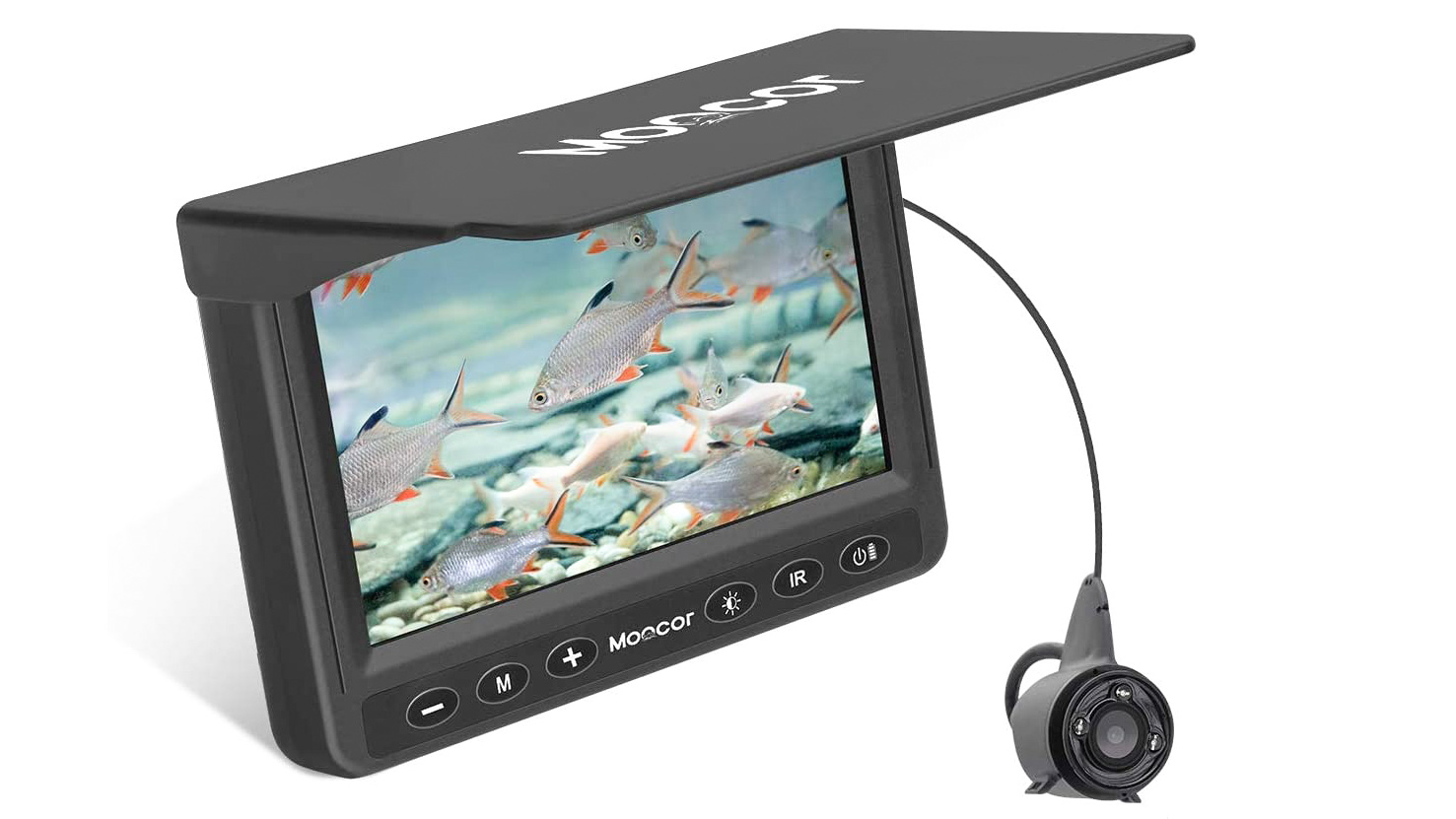
3. Moocor HD 1000
Specifications
Reasons to buy
Reasons to avoid
With a 4.3 inch monitor on a reasonably generic monitor, the Moocor doesn’t look anything special at first glance, but to the ice fisher it’s a potential game changer. Neatly tucked to the back of that screen is 15m / 50ft of cable, for a start, which connects into a neat little camera housing that has been designed with cable clips at different points so the HD camera can be angled according to conditions.
There are also three IR lights around the lens which can be enabled according to conditions. We also liked the combined screen shade / cover; using displays in bright conditions is never easy and this definitely helps. If fishing in clear ice water, you may also appreciate the 4x digital zoom to see closer into the waters without disturbing the fish.
Best underwater fishing camera for sharp images
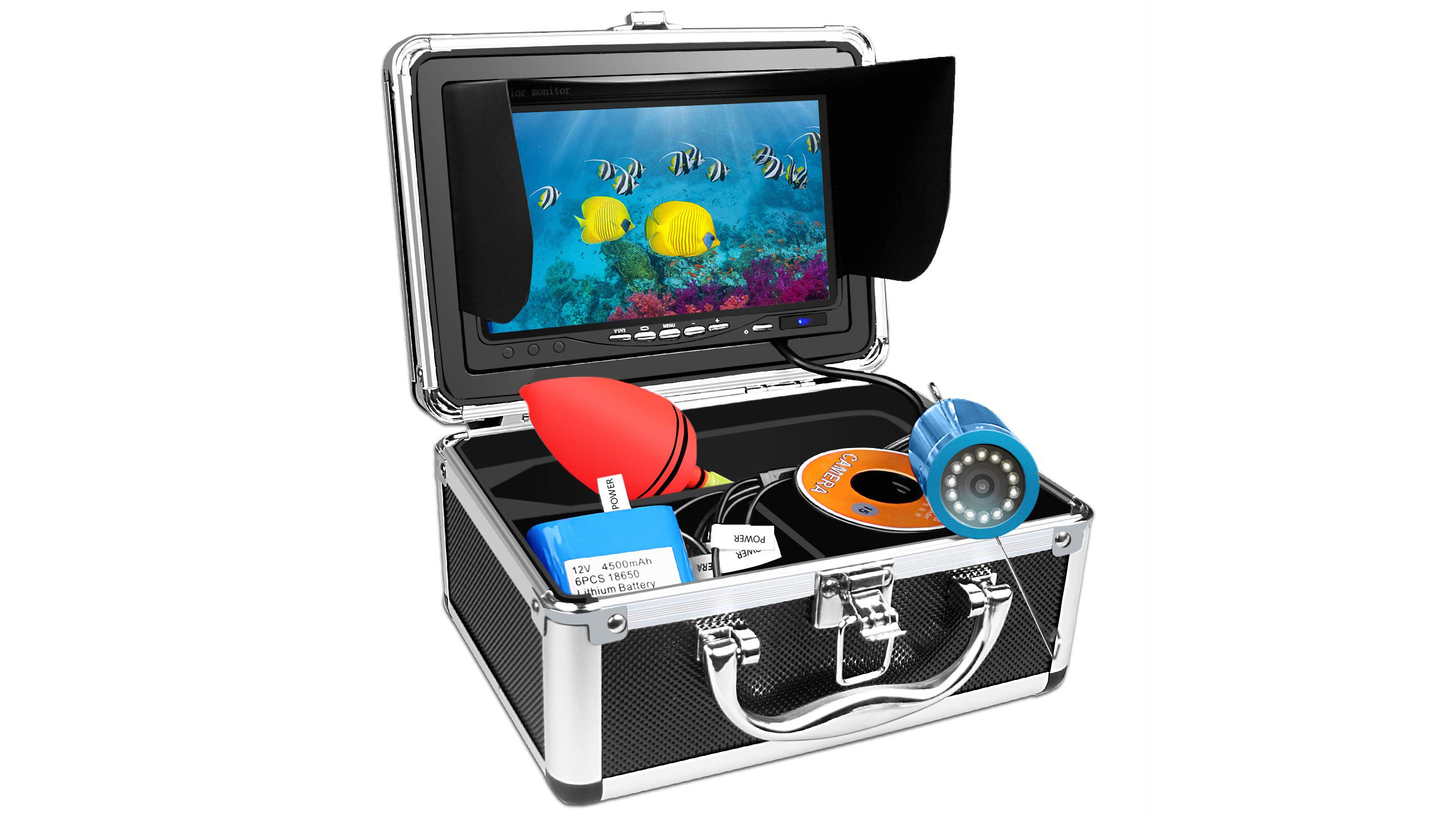
4. Anysun Underwater Fishing Camera
Specifications
Reasons to buy
Reasons to avoid
Offering a very similar specified – and indeed nigh identical looking – box of tricks to the Eyoyo offering, for a price within the same ballpark, Anysun’s claim is that its IP68 certified waterproof camera system is so sharp you’ll be able to clearly see the fish actually bite your bait.
Added to this, its chunky 12-volt battery will last an impressive 9 to 12 hours’ worth of angling. With a 7-inch monitor boasting a sun visor and 1,000 lines of resolution, you basically have everything we need to record and view what’s up to 15m below the surface – even if the water itself is murky.
Best underwater fishing camera for deep sea fishing
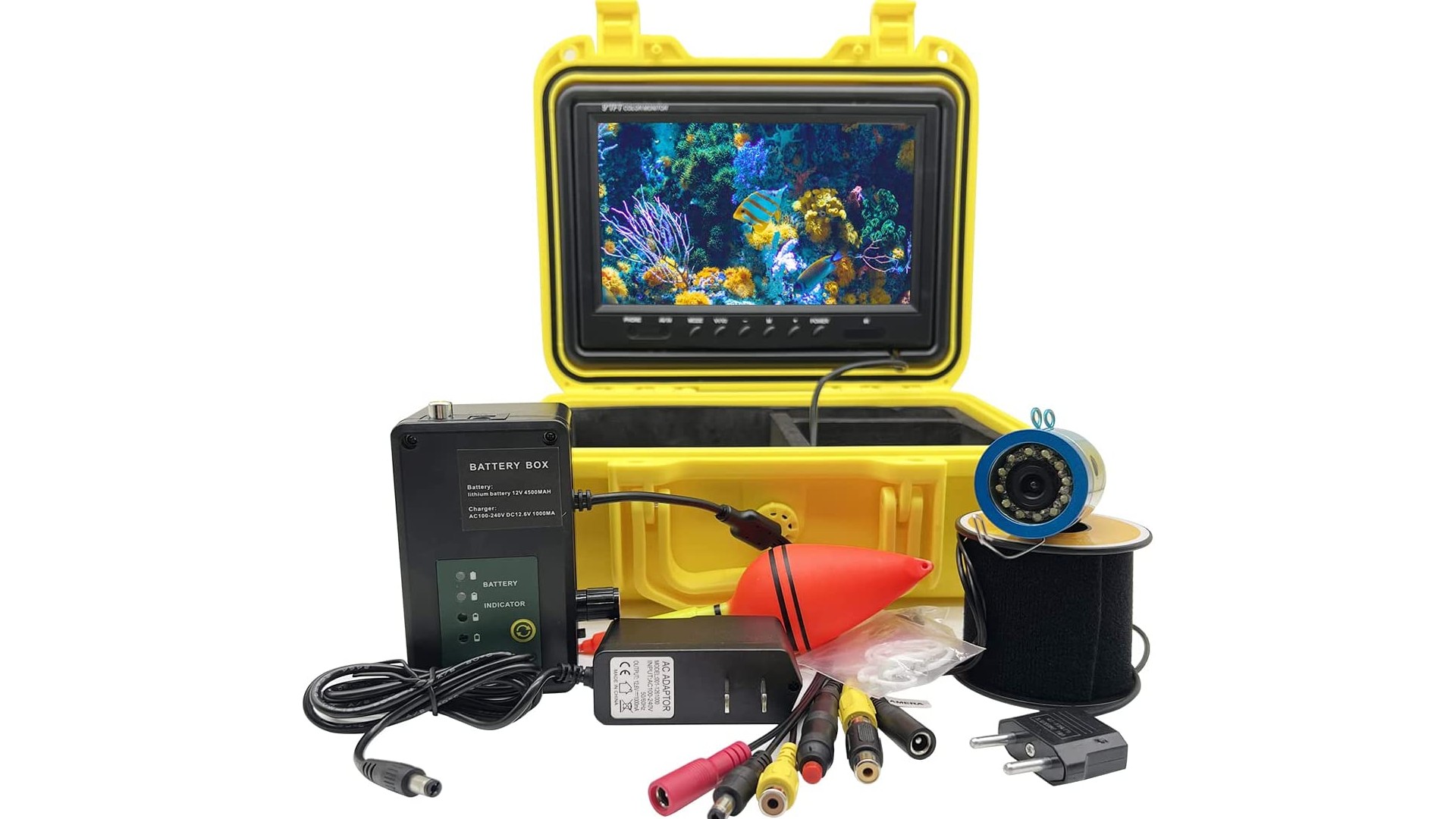
5. Mingbosky Portable Underwater Fishing Camera
Specifications
Reasons to buy
Reasons to avoid
There's a lot to like about the latest version of the Mingbosky Portable Underwater Fishing Camera. It can function at up to 50ft (15m) or 100ft (30m), depending on model. It comes with a cable to match, allowing you to view the action on the included nine-inch monitor, which comes with a removable sun-visor. We also like how short springs at the end of the camera enable easy turns in the pipe, which is especially useful in hard-to-reach locations
The inclusion of 12 LED lights and 12 infred lights help it see more clearly in the dark. The 4500 mAh rechargeable battery can be used for 6-8 hours on a single charge. And it can operate between -20- and -60°C, making it suitable for ice fishing. Finally, it all comes in a lovely aluminium suitcase.
Best underwater fishing camera alternatives
The best underwater drone for larger prey
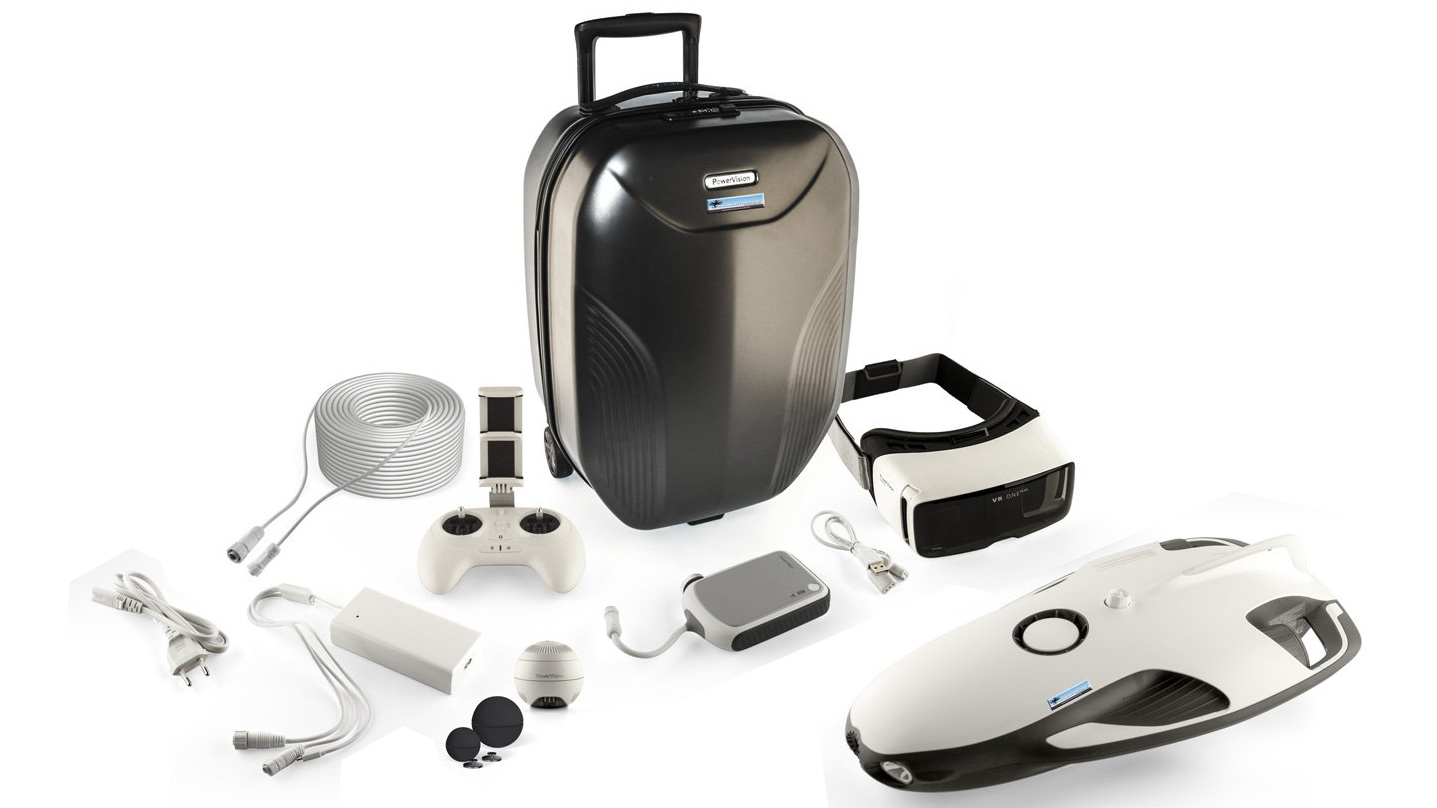
6. PowerVision PowerRay Wizard underwater drone
Specifications
Reasons to buy
Reasons to avoid
Our final three selections aren't fishing cameras per se, but they may help in your fishing endeavours. First of all, if you’re looking to catch bigger ocean-bound dwellers, then an underwater drone could be your step-up product.
Included in this package are not just the 12-megapixel sensor, 4K resolution camera-incorporating drone and handset, but also some VR goggles/headset, a 64GB memory card and 210ft tether. Also impressive is the ability for the PowerRay to transmit images via Wi-Fi up to a distance of 262 feet, plus it’s usable to depths of 30m. Yes, it's expensive, but if you’re serious about getting deep into your hobby there is a lot of scope here.
The best sonar image camera
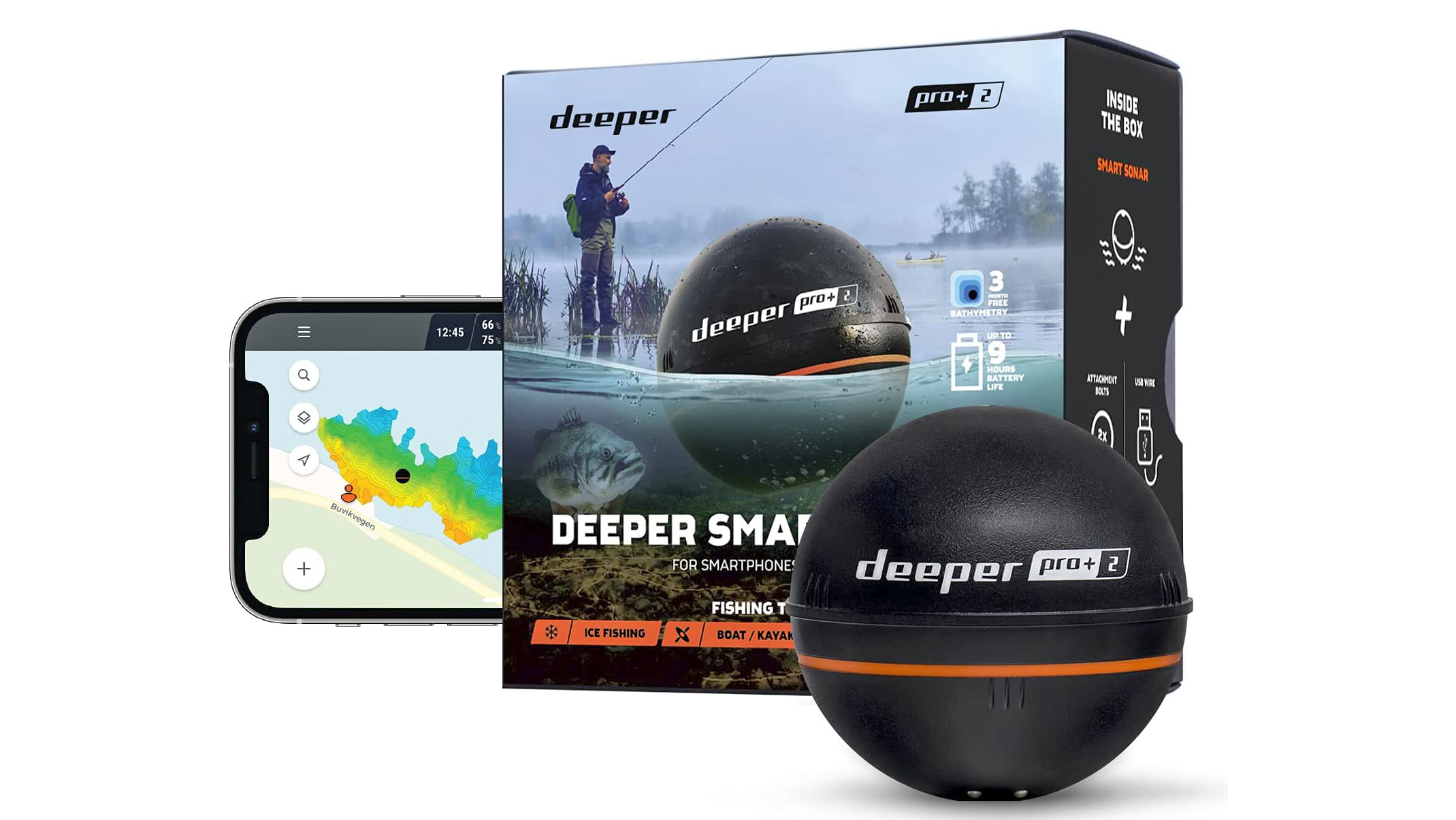
7. Deeper Smart Sonar Pro+ 2
Specifications
Reasons to buy
Reasons to avoid
If you’re looking deep underwater solely for the purposes of fishing, then actually seeing into the murky depths might not be the ideal solution; sonar imaging may be more useful. You’ll be pleased to hear you don’t need dolphin-like intelligence to interpret the reflected sounds of nearby fish; instead modern tools will examine the sub-surface environment and highlight targets for you, more than likely with fish icons.
The Deeper Pro Plus 2 use multiple beam frequencies and its own AI to tell you where fish are, presenting it as clearly as possible on your phone screen with GPS data. All this in a ball which weighs 90g (3.2oz) and goes on the end of your line, but can broadcast (and hear) three beam frequencies for up to nine hours to help you identify fish with a precision of between one and 2.4cm (depending on the depth). The visuals here will also help a fisher identify the bed and vegetation. So you’ll use your time better, even if you’re not looking your targets in the eye with a camera.
The best underwater compact for diving
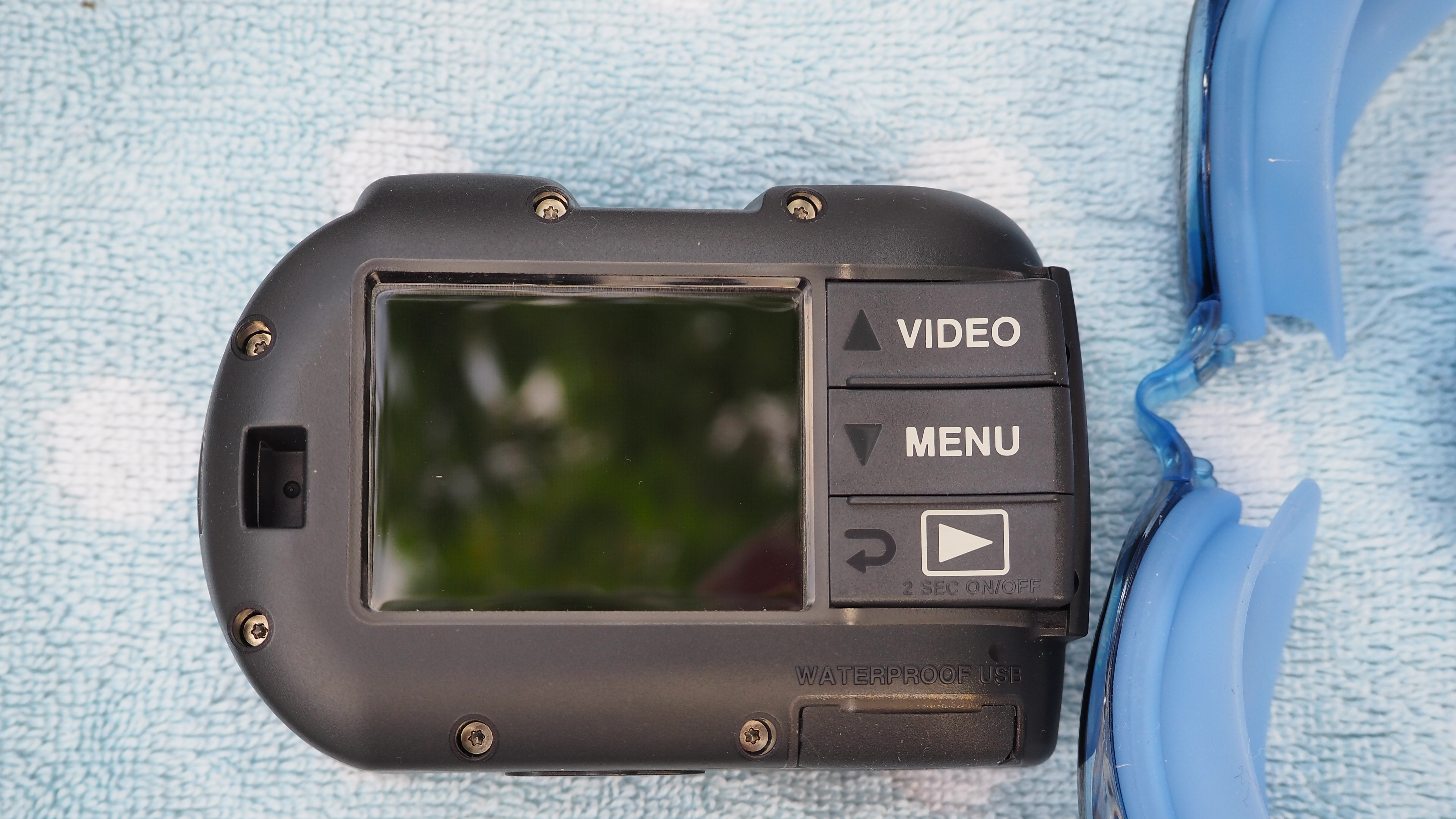
8. Sealife Micro 3.0 64GB
Our expert review:
Specifications
Reasons to buy
Reasons to avoid
Finally, you may be considering going on a dive to survey a location, and check out its suitability for fishing. In which case, this lovely underwater compact is worth a look.
It's depth-rated to an impressive 60m/200ft, and can also withstand a 1-metre drop all from a device. Plus, where many toughened compact cameras will shoot underwater, their buttons and controls can be small and fiddly: not so here. A simple layout of three large piano keys on the rear panel and just a large shutter button up top make it all easily usable while wearing dive gloves.
Images are captured by a 16MP Sony 1/2.3-inch sensor that can also capture 4K video. It's fronted by a wide-angle lens with a 100-degree field of view. Built-in Wi-Fi allows you to wirelessly preview, download and share photos and videos
The battery is built in and good for over three hours use, while 64GB of internal memory takes care of image and video storage (note there's no removable media option). For more details, see our SeaLife Micro 3.0 underwater camera review.
FAQs
What is an underwater fishing camera?
An underwater fishing camera is a specialized device designed to capture high-quality images and videos underwater, specifically for fishing purposes. These cameras are typically waterproof and equipped with features tailored to the needs of anglers, such as durable construction, low-light performance, and fish-finding capabilities.
What are underwater fishing cameras used for?
Underwater fishing cameras can be deployed in various fishing environments, including lakes, rivers, and oceans, providing fishing enthusiasts with valuable insights to improve their fishing success. They may be used to scout the location of fish, monitor bait presentation and effectiveness, identify specific fish species and observe the habits of underwater wildlife. Some models offer live streaming to mobile devices while others have recording capabilities for later review and analysis.
What are the limitations of underwater fishing cameras?
Underwater fishing cameras are typically limited by poor water clarity, due to factors such as sediment and algae, and low light conditions in deep or otherwise dark waters. Underwater currents, waves, or debris can disrupt camera positioning or obstruct the field of view. Also some fish may be wary of the presence of underwater cameras, leading them to alter their behavior or avoid the area altogether. Finally, particular models may be limited in terms of battery life and the depth they are able to function at.
How to choose the best underwater camera
When selecting the ideal underwater camera for fishing, there are a number of factors to take into account. Firstly, think about how high you want the resolution to be. A higher figure will provide clearer images and videos of underwater action, aiding in fish identification and assessing habitat, although it'll also mean the camera will likely cost more. Also think about waterproofing and shockproof features, which will determine how deep you can go and in what condition, as well as low-light performance, battery life, and mounting options to suit your particular needs.
How we test the best underwater cameras
When we test underwater cameras, we assess waterproofing capabilities by submerging the camera at varying depths to verify its specified waterproof rating. We evaluate image and video quality in different lighting conditions, including low light and murky waters, to gauge clarity and color accuracy. We also conduct simulated fishing scenarios so we can examine factors such as resistance to impacts, scratches, and underwater pressures, along with how easy the camera is to mount and use in practice, and how the battery life and storage capacity perform.
Read more:
Get the Digital Camera World Newsletter
The best camera deals, reviews, product advice, and unmissable photography news, direct to your inbox!
Gavin has over 30 years’ experience of writing about photography and television. He is currently the editor of British Photographic Industry News, and previously served as editor of Which Digital Camera and deputy editor of Total Digital Photography.
He has also written for a wide range of publications including T3, BBC Focus, Empire, NME, Radio Times, MacWorld, Computer Active, What Digital Camera and the Rough Guide books.
With his wealth of knowledge, Gavin is well placed to recognize great camera deals and recommend the best products in Digital Camera World’s buying guides. He also writes on a number of specialist subjects including binoculars and monoculars, spotting scopes, microscopes, trail cameras, action cameras, body cameras, filters and cameras straps.

